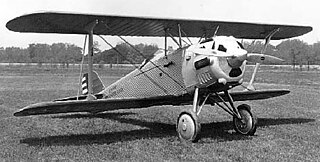Related Research Articles

The Curtiss A-8 was a low-wing monoplane ground-attack aircraft built by the United States company Curtiss Aeroplane and Motor Company, designed in response to a 1929 United States Army Air Corps requirement for an attack aircraft to replace the A-3 Falcon. The Model 59 "Shrike" was designated XA-8.

The Blériot SPAD S.510 was the last French biplane fighter to be produced.

The Thomas-Morse MB-3 was an open-cockpit biplane fighter primarily manufactured by the Boeing Company for the U.S. Army Air Service in 1922. The MB-3A was the mainstay fighter for the Air Service between 1922 and 1925.

The XP-13 Viper was a prototype biplane fighter aircraft designed by the American company Thomas-Morse Aircraft Corporation. The airplane was delivered to the United States Army in 1929, but they did not adopt it.

The Boeing XP-15 was an American prototype monoplane fighter.

The Douglas O-31 was the Douglas Aircraft Company's first monoplane observation straight-wing aircraft used by the United States Army Air Corps.

The Thomas-Morse O-19 was an American observation biplane built by the Thomas-Morse Aircraft Company for the United States Army Air Corps.

The Hansa-Brandenburg W.19 was a German fighter-reconnaissance aircraft of World War I. It was a single-engined two-seat biplane floatplane, and was a larger development of the successful W.12. It served with the Kaiserliche Marine during 1918.

The Curtis XF13C was a carrier-based fighter aircraft built by Curtiss Aeroplane and Motor Company.

The Thomas-Morse MB-2 was an open-cockpit biplane fighter manufactured by Thomas-Morse Aircraft for the U.S. Army Air Service in 1918.

The Thomas-Morse MB-6 was an American racing aircraft built by Thomas-Morse Aircraft for the US Army Air Service.

The Thomas-Morse MB-7 was an American racing plane built by Thomas-Morse Aircraft for the US Navy.

The Bristol Type 146 was a British single-seat, eight-gun fighter monoplane prototype built to a mid-1930s Air Ministry contract. Powered by a radial engine, it was outclassed by Merlin-engined fighters and only one was built.

The Fokker PW-5 was a Dutch fighter aircraft of the 1920s. It was a parasol monoplane of which twelve were built for the US Army Air Service, being used as advanced trainers.

The Thomas-Morse R-5 also known as the TM-22 was an American single-engined parasol monoplane racing aircraft of the 1920s. Two were built for the United States Army Air Service in 1922, but after competing in the 1922 Pulitzer Trophy Race the type was abandoned.

The Thomas-Morse MB-4 was a prototype American mailplane of the 1920s. It was of unusual design, being a biplane with twin fuselages housing the crew of two and a central nacelle which carried the aircraft's twin engines in a push-pull configuration.
The Thomas Morse MB-9 was an experimental American fighter aircraft of the 1920s. It was a single-engined, single-seat parasol winged monoplane, but was unsuccessful, being quickly abandoned.
The Mitsubishi J4M Senden or Navy Experimental 17-Shi Otsu B Type Interceptor Fighter Senden, Allied reporting name Luke, was a Japanese World War II fighter aircraft proposed by Mitsubishi for use by the Imperial Japanese Navy. The J4M project did not proceed beyond the design stage.

The Thomas-Morse TM-24 was a prototype American two-seat observation aircraft of the 1920s. A single example was built in 1925, but no production followed.
The Mosca-Bystritsky MBbis was a fighter aircraft developed and used by the Imperial Russian Air Service during the First World War.
References
| Wikimedia Commons has media related to Thomas-Morse MB-1 . |
- Notes
- Bibliography
- Angelucci, Enzo (1987). The American Fighter from 1917 to the present. New York: Orion Books. ISBN 0-517-56588-9.
- Wegg, John (1990). General Dynamics Aircraft and their Predecessors. London: Putnam. ISBN 0-85177-833-X.